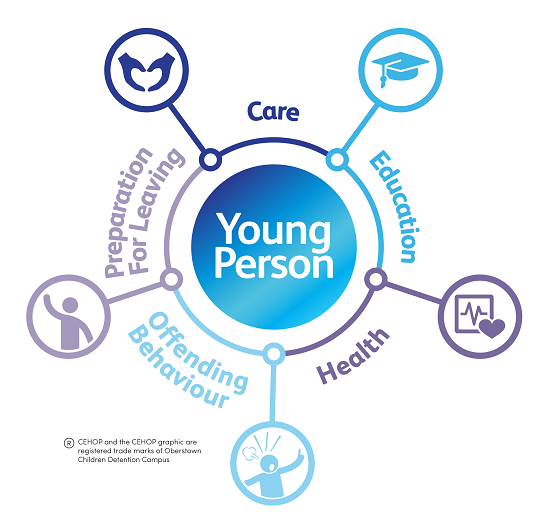Model of Care
CEHOP®
Oberstown’s model of care, CEHOP®, has five pillars: Care, Education, Health, Offending Behaviour, and Preparation for Leaving.


In Oberstown we apply a care framework that guides all stages of a young person’s journey from their entry until they leave us. This framework is used in the development of individual placement plans for each young person.
Our intake process represents a relationship building opportunity. The manner in which this is completed can assist in the promotion of a positive and collaborative relationship between our young people and staff. Following intake, we assess and identify each person’s specific needs. This enables us to put care measures in place to meet those identified needs, build positive relationships and ensure that planning includes family and significant people in their lives as well as appropriate outside agencies.
Each young person’s care needs are assessed in detail by our professional care team. This assessment identifies current, as well as emerging needs, both of which are central to the development and delivery of care to our young people. Care needs can be short, medium, or long-term and can differ from person to person depending on circumstances that existed prior to admission. Needs may include developmental needs as well as identity ones. Our care team understand the importance of acknowledging the young person’s voice in the delivery of our care services.
Care is provided by a professional, multi-disciplinary team with training and expertise in the range of care services our young people require. Their focus is on providing care and other programmes that will support the young person’s return to the community at the end of their time with us. Our focus at all times is to ensure that our young people are safe and that we are expert in the delivery of our care services to all.

Oberstown is a community with an emphasis on learning for all young people being detained. We have two educational centres on our Campus, each offering young people with opportunities to engage in a myriad of learning choices during their placement.
Learning opportunities take three main forms:
- Structured, such as school
- Specialised, including risk reduction programmes
- Informal learning during daily life in the residential unit.
We take a partnership approach to education where our purpose-built school, which is run by the Dublin and Dun Laoghaire Education and Training Board (DDLETB), works in collaboration with our Care community and others outside our Campus.
All young people attend school while they are detained at Oberstown. We regard the provision of education and access to appropriate training programmes as being a core element of each person’s journey through care and is at the heart of everything we do. During our intake process, we assess each young person in relation to their specific educational requirements and we put an individual plan in place to address those needs. At our purpose-built school, all young people have access to subjects that are part of the national curriculum. All teachers are professional, qualified and experienced and encourage each young person to complete state exams and continue vocational training. We measure educational outcomes in a number of ways, from looking at improvements in literacy and numeracy to participation in state examinations. The ultimate objective is to equip each young person with the skills and sense of achievement that will help them towards a successful return to the community.

In Oberstown we develop a plan for every young person. A key part of this covers their total health and wellbeing needs, including their physical, mental, emotional and social health. We assess them for physiological and psychological concerns at the point of arrival at Oberstown and draw up a care plan to provide the necessary care to meet the needs identified by our assessment.
Our overall emphasis in Oberstown is on health promotion. We manage health and wellbeing in a multidisciplinary way through medical, dental, psychological, psychiatric and wellbeing programmes that are in young person centred and collaborative in nature.
We have a fully equipped medical facility on campus where our young people can access medical services and support. Any specific medical and mental health need is identified as part of our initial assessment and is addressed in the context of each child’s individual care plan, which looks after any specific or unique requirement.
Health and wellbeing improvements are measured in a number of ways from raised health awareness, improved levels of health, better engagement between our young people and their own health literacy. We achieve these improvements through being aware of needs and intervening appropriately.

Our mission is to support each young person before, during and after their attendance at court. We ensure that they are informed, prepared and supported for their attendance in court and during their placement in Oberstown.
While on placement with us, we assess each young person in terms of the reasons they have been sent to Oberstown. From this assessment, we can provide the opportunity to learn practical skills that will support their return to the community and reduce the likelihood of relapse. It is critical that we understanding each person’s needs and, equipped with that understanding, we can then deliver the appropriate intervention and care programme.
We recognise that our young people are placed at Oberstown as a consequence of their offending behaviour. We address this through the delivery of risk reduction programming. Here our emphasis is on identifying risk areas for young people and delivering specific interventions to reduce these risks. This may include alcohol or substance abuse and anti-social behaviour.
Oberstown also offers the opportunity for each young person to learn and develop pro-social skills which in turn leads to lower levels of re-offence.

From the outset, we start the journey with the end in mind. From the moment the young person arrives we consider what would happen if they were to leave tomorrow and prepare them as best we can for that. Depending on the length of their remand or detention, we develop plans based on their short, medium and long-term needs, always focusing on their ultimate return and reintegration into the community and reducing the risk of re-offending.
Preparation for leaving involves practical programmes that are regularly reviewed and constantly supervised. These cover all aspects of their care including accommodation, living skills, finances, work, education and health. We involve all relevant parties which includes the young person themselves as well as the key people in their lives such as parents/family, carers, as well as representatives from care, education, health and other relevant external agencies.

